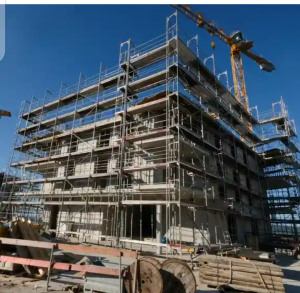Germany Revises Housing Plans, Scraps Stricter Building Rules Amid Crisis.

In response to a mounting housing crisis and a beleaguered construction and housing industry, the German government has unveiled a comprehensive 14-point plan, including measures to relax environmental standards, to address the pressing issues. This decision coincided with a crucial meeting of government officials and industry leaders, where Chancellor Olaf Scholz confronted the challenges facing the construction sector.

Chancellor Scholz emphasized the need for more affordable housing in Germany, declaring an expansion of building sector activities as the way forward. This announcement followed discussions with representatives from the German construction industry.
Key elements of the government’s plan to tackle the housing crisis include a halt to plans to enforce stricter building insulation standards, particularly the EH40 energy-saving standard, which had been set to become mandatory by 2025. EH40 mandates that buildings use only 40% of the energy of comparable new structures.
The coalition of the Social Democrats (SPD), Greens, and Free Democrats (FDP) had previously agreed on EH40 as the new standard, but it will now be suspended due to the challenging conditions in the construction and housing industry, marked by high interest rates and construction costs.

German Economy Minister Robert Habeck acknowledged the burden of high interest rates and inflation on the construction industry, stating that insulation measures could be postponed. The government intends to invest a record €18 billion ($19.06 billion) in the sector between now and 2027.
Additional measures in the plan encompass expanding access to affordable credit and introducing a “climate bonus” to incentivize the replacement of fossil-fuel heating systems with eco-friendly alternatives. Furthermore, the government aims to streamline building codes, making construction more cost-effective by allowing standardized housing types to receive blanket approval.

This change in approach aims to lower standards and reduce costs, ultimately facilitating housing projects, including the conversion of office and retail spaces into residences and subsidizing renovations of existing buildings.
German residential property prices have faced a significant downturn, with the steepest decline in prices recorded this year since 2000. Building permits for apartments also dropped by 31.5% in July compared to the previous year.
Despite the government’s new direction being welcomed by some, such as the Germany Property Federation (ZIA), environmental groups like the German branch of Friends of the Earth (BUND) expressed concerns about the plan’s impact on climate and affordability.
While this policy shift aims to address the housing crisis, it has ignited a debate over the balance between environmental standards and housing affordability in Germany.
[Source: DW NEWS (Reuters, AFP, dpa)]




